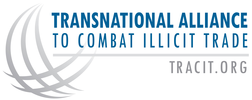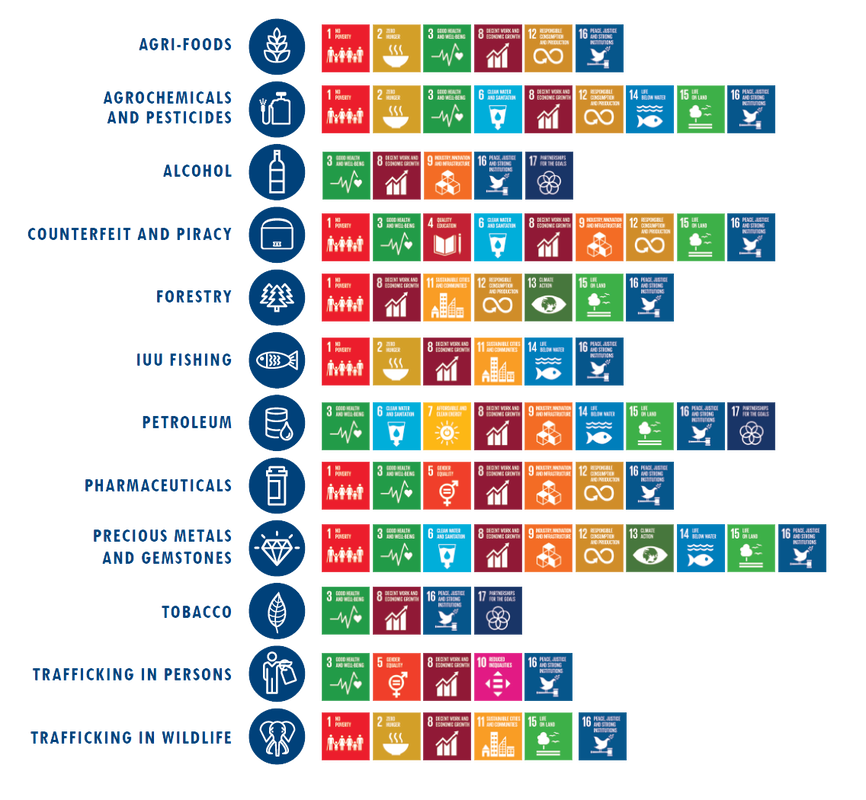|
In 2015, G7 leaders joined more than 150 other world leaders to formally adopt the 2030 Agenda for Sustainable Development and its 17 Sustainable Development Goals (SDGs). The SDGs have emerged as the blueprint for achieving sustainable development and cover everything from poverty eradication and zero hunger to clean water, decent jobs and peace. Since coming into effect in January 2016, governments, private sector and civil society have rallied around the SDGs to guide policy, implement investment strategies and allocate funding. But while the 2030 Agenda is clear in recognizing that trade will be an important means to achieving the SDGs, little attention has been given to the illicit side of the trade ledger. This is a crucial oversight because illicit trade significantly compromises achievement of the SDGs by crowding out legitimate economic activity, depriving governments of revenues for investment in vital public services, dislocating hundreds of thousands of legitimate jobs and causing irreversible damage to ecosystems and human lives. These alarming consequences are especially evident in developing countries, holding back progress, increasing costs and pushing achievement of the goals further away. With regard to challenge of financing development, the economic leakages across the sectors susceptible to illicit trade create an annual drain on the global economy of US$2.2 trillion, [1] and present a triple threat to financing the investment needed to reach achieve the SDGs.[2] In short, illicit trade:
This is especially important in the light of the 2019 Financing for Sustainable Development Report, which warns that mobilizing sufficient financing remains a major challenge in implementing the 2030 Agenda and investments that are critical to achieving SDGs remain underfunded. [3] Mapping illicit trade against the SDGs The 2030 Agenda obligates member states—not the UN—to take steps to implement the SDGs and report on progress. As such, the UN itself will not be “implementing the SDGs”. Instead, the UN’s role is to help governments implement, report on progress, and share data. In order to help governments better understand how their efforts to achieve sustainable development must account for the negative forces of illicit trade, the Transnational Alliance to Combat Illicit Trade (TRACIT) prepared a study that maps the 17 UN SDGs against the following sectors: agri-foods, alcohol, fisheries, forestry, petroleum, pharmaceuticals, precious metals and gemstones, pesticides, tobacco, wildlife and all forms of counterfeiting and piracy. These sectors were chosen because they participate significantly in international trade and they are particularly vulnerable to illicit trade. Trafficking in persons is also examined as a particularly abhorrent phenomenon affecting supply chains and basic human rights as well as contributing to illicit trade practices. TRACIT collaborated with the UN Conference on Trade and Development (UNCTAD) to initiate a dialogue on Illicit Trade and the Sustainable Development Goals. [4] The meeting was held at UNCTAD Headquarters in Geneva on 18 July 2019, and was designed to help governments understand the challenge of illicit trade and to consider policy measures that account for the negative impacts of illicit trade on the SDGs.
In many ways, achieving SDG 16 is prerequisite for achieving all the goals, as it aims to deliver peaceful and inclusive societies with effective governance based on rule-of-law principles. Illicit trade–in all its forms–stands in direct juxtaposition to this goal and threatens SDG 16 and its underlying targets: Feeding violence (16.1), exploiting women and children (16.2), undermining trust in institutions and the rule of law (16.3), generating enormous illicit financial flows (16.4), breeding corruption (16.5), and financing terrorism (16A).
Moreover, the links between illicit trade and organized crime are well established, from human trafficking networks and tobacco smuggling, to fuel theft by drug cartels and the involvement of the mafia and organized criminal groups in the trade of counterfeit goods. Communities and economies are further destabilized when billions of dollars of criminal profits are reinvested into other illicit activities. Perhaps most frightening are links to terrorist financing that heighten threats to national and global security. In addition to holding back progress, increasing costs and pushing the attainment of the goals further away, all types of illicit trade threaten inclusive economic growth and significantly hinder achievement of SDG 8 (Decent Work and Economic Growth). Lost taxes of all kinds—corporate, sales, personal income, excise and value-added—rob governments of revenues intended for schools, infrastructure and other public services. Illegal and unfair competition reduces sales and dampens the ability of legitimate companies to create lasting and dignified job opportunities. The specter of criminality and associated instabilities erodes the rule-of-law that underpins investment and weakens a country’s credit ratings, which are needed to secure financing and attract investment. Implications for G7 The sweeping, negative impacts of illicit trade on the SDGs point to a wide range of challenges for both governments and business. To remain on track towards the SDGs, countries must prioritize efforts to combat illicit trade and plug the fiscal leakages associated with it. The Group of Seven (G7) countries represent seven of the largest and most industrialized economies in the world and collectively hold roughly 58% of the world’s wealth. Given the G7’s recurring commitment to the 2030 Agenda, it is incumbent on the group to amplify its attention to the problem and to press for implementation and enforcement of all its standing declarations against illicit trade. As global leaders in trade and development, their commitment to address the threat of illicit trade on the SDGs would raise awareness and drive action on a global scale. Notably, illicit trade is not a problem confined to any single country or region; every country suffers from this menace, all that varies is the magnitude of the problem. The negative impacts also extend well beyond national borders, with extensive ripple effects across global markets. Hence, it will be expedient for G7 countries to attend and support the capabilities of other countries to better defend against illicit trade, especially developing countries who are already hard-pressed to monetize resources, commercialize innovation, attract investment, establish lasting job opportunities and create genuine, long-term economic growth. Without concurrent efforts to combat all forms of illicit trade – and the associated corruption and organized crime – the global community will not be able to achieve the overarching sustainable development goals to end poverty, protect the planet, and ensure that all people enjoy peace and prosperity. Biarritz G7 Summit The Biarritz G7 Summit has identified fighting inequality as one of its key objectives. We believe that the Summit presents a timely opportunity for Leaders to elevate priority attention to illicit trade, given its correlation to higher poverty, reduced peace and security, and income, health and gender inequality. The SDGs are integrated and indivisible in nature with significant inter-linkages across the goals and targets. Ending poverty, for example, must go hand-in-hand with strategies that build economic growth and address a range of social needs including education, health, social protection, job opportunities and environmental stewardship. By the same token, a holistic approach is needed to address the significant number of interdependencies and overlapping problems relating to multiple forms of illicit trade. The impacts of illicit trade cannot be examined effectively in isolation of other sectors, nor can they be addressed in isolation of the SDGs. Fighting illicit trade must therefore be seen not only as a global responsibility of G7 leaders, but also recognized as a prerequisite to achieve the UN SDGs. Role of private sector Public and private actors can play an important role in determining a responsive, evidence-based work program for addressing illicit trade, including delineation of best practices, and, where applicable, development of regulatory standards. In this regard, the Transnational Alliance to Combat Illicit Trade (TRACIT) provides a platform for business and governments to collaborate holistically to mitigate the incumbrance of illicit trade on the SDGs. Mapping the impacts of illicit trade on the UN Sustainable Development Goals is part of TRACIT’s contribution to the partnership approach embodied in SDG 17 and a means by which business, the public sector and civil society—working in partnership—can more effectively achieve the goals. Louis Bonnier Director of Programs, TRACIT Notes [1] Global Financial Integrity. (2017). Transnational Crime and the Developing World. Washington D.C.: Global Financial Integrity [2] Australian Government Department of Foreign Affairs and Trade. (n.d.). Financing the Sustainable Development Goals. Canberra: DFAT. [3] Inter-agency Task Force on Financing for Development, Financing for Sustainable Development Report 2019, https://developmentfinance.un.org/node/2463 [4] https://unctad.org/en/Pages/MeetingDetails.aspx?meetingid=2182 Comments are closed.
|
About tracit talking pointsTRACIT Talking Points is a channel we’ve opened to comment on current trends and critical issues. This blog showcases articles from our staff and leadership, along with feature stories from our partners in the private sector and thought-leaders from government and civil society. Our aim is to deepen the dialogue on emerging policy issues and enforcement measures that can be deployed against illicit trade.
Categories
All
Archives
February 2024
|
|
Transnational Alliance to Combat Illicit Trade (TRACIT) is an independent, non-governmental, not-for-profit organisation under US tax code 501(c)(6).
© COPYRIGHT 2024. ALL RIGHTS RESERVED. |
Follow us
|

